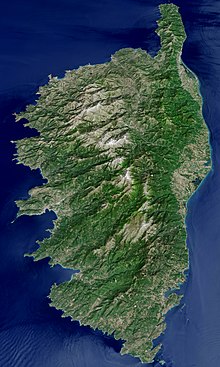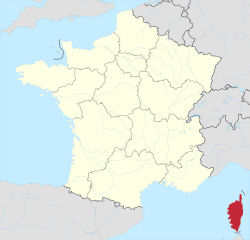**History of Corsica:**
– Inhabited since the Mesolithic era.
– Passed through the hands of various rulers, including the Romans, Vandals, Ostrogoths, Carthaginians, and Greeks.
– Annexed by France in the 18th century.
– Known for its association with Napoleon Bonaparte.
– Has a history of striving for independence.
**Geography and Population of Corsica:**
– Fourth largest island in the Mediterranean Sea.
– Diverse landscape with mountains and beautiful coastal areas.
– Home to several natural parks.
– Population of 355,528 as of January 2024.
– Third-least populated region of France after Mayotte and French Guiana.
– Divided into two administrative departments, Haute-Corse and Corse-du-Sud.
**Language and Culture of Corsica:**
– French is the official and most widely spoken language.
– Corsican, a native tongue, is recognized as one of France’s regional languages.
– Italian is also widely spoken.
– Influenced by Italian and French traditions.
– Rich in music and festivals.
– Strong emphasis on family and community.
– Traditional cuisine includes seafood and charcuterie.
**Autonomy and Government of Corsica:**
– Expected to achieve a form of autonomy in the near future.
– Regional capital is Ajaccio.
– Corsican Assembly exercises limited executive powers.
– Corsica’s autonomy is more far-reaching than other regional collectives of France.
– Tensions between local autonomy and French control.
**Economy and Politics of Corsica:**
– Relies heavily on tourism.
– Agriculture plays a significant role.
– Challenges with unemployment rates.
– Limited industrial development.
– Government subsidies support the economy.
– Special status within the French Republic.
– Regional Assembly governs the island.
– Struggles with preserving Corsican identity.
– Issues with nationalist movements.
Corsica (/ˈkɔːrsɪkə/ KOR-sik-ə, Corsican: [ˈkorsiɡa], [ˈkɔrsika], Italian: [ˈkɔrsika]; French: Corse [kɔʁs] ⓘ; Ligurian: Còrsega) is an island in the Mediterranean Sea and one of the 18 regions of France. It is the fourth-largest island in the Mediterranean and lies southeast of the French mainland, west of the Italian Peninsula and immediately north of the Italian island of Sardinia, the nearest land mass. A single chain of mountains makes up two-thirds of the island. As of January 2024[update], it had a population of 355,528.
Collectivity of Corsica
| |
|---|---|
 | |
| Anthem: Dio vi salvi Regina (unofficial) | |
 Location of Corsica within France | |
| Country | |
| Prefecture | Ajaccio |
| Departments | 2
|
| Government | |
| • President of Executive Council | Gilles Simeoni (Femu a Corsica) |
| • President of the Corsican Assembly | Marie-Antoinette Maupertuis |
| • Prefect | Amaury de Saint-Quentin |
| Area | |
| • Total | 8,722 km2 (3,368 sq mi) |
| Population (2024) | |
| • Total | 355,528 |
| • Density | 41/km2 (110/sq mi) |
| • Languages | French (official) Corsican Ligurian |
| Demonym | Corsican |
| GDP | |
| • Total | €10.304 billion (2022) |
| • Per capita | €30,500 (2022) |
| Time zone | UTC+1 (CET) |
| • Summer (DST) | UTC+2 (CEST) |
| ISO 3166 code | FR-20R |
| Website | www |
The island is a territorial collectivity of France, and is expected to achieve "a form of autonomy" in the near future. The regional capital is Ajaccio. Although the region is divided into two administrative departments, Haute-Corse and Corse-du-Sud, their respective regional and departmental territorial collectivities were merged on 1 January 2018 to form the single territorial collectivity of Corsica. Corsican autonomy is more far reaching than other regional collectives of France and the Corsican Assembly is permitted to exercise limited executive powers. Corsica's second-largest town is Bastia, the prefecture of Haute-Corse.
Corsica was ruled by the Republic of Genoa from 1284 to 1755, when it seceded to become a self-proclaimed, Italian-speaking Republic. In 1768, Genoa officially ceded it to Louis XV of France as part of a pledge for the debts incurred after enlisting French military help in suppressing the Corsican revolt; as a result France annexed the island in 1769. The future Emperor of the French, Napoleon Bonaparte, was a native Corsican, born that same year in Ajaccio: his ancestral home, Maison Bonaparte, is now a visitor attraction and museum. Because of Corsica's historical ties to Tuscany, the island has retained many Italian cultural elements, and many Corsican surnames are rooted in the Italian peninsula.
French (Français) is the official and most widely spoken language on the island. Corsican, the native tongue and an Italo-Dalmatian language, is recognized as one of France's regional languages. Italian is also widely spoken.
Corsica is the third-least populated region of France after Mayotte and French Guiana.


